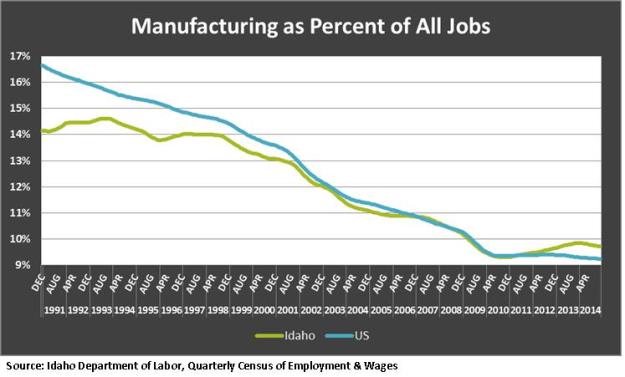Over the past two decades, manufacturing with its traditionally higher-paying jobs has become a smaller and smaller component of both the national and Idaho economies.
Manufacturing in Idaho has staged a modest rebound since the end of the recession, primarily in food processing – the lowest-paying piece of the three-part manufacturing super sector. But it still remained well below its 1990 levels although in 2013 manufacturing accounted for a greater percentage of Idaho jobs than it did nationally.
Even with that gain, however, the composition of Idaho’s manufacturing sector has changed significantly over the past 20 years even as its overall economic impact has declined. What was essentially a fairly even split of jobs among nondurable production like food processing, resource manufacturing like wood products, and other durables like computer chips and machinery, has become dominated by production of other durables as wood products manufacturing steadily contracted.
In 1991 manufacturing accounted for over 14 percent of all Idaho jobs and nearly 19 percent of total wages. Nondurable manufacturing accounted for 4.5 percent of all jobs, resource manufacturing 5.1 percent and other durables 4.8 percent.
Twenty-two years later, manufacturers provided 9.4 percent of all jobs and less than 14 percent of wages, up from under 9 percent of jobs and 12.4 percent of wages in 2010. Nondurable manufacturing accounted for 2.8 percent of all jobs, resource manufacturing 2.3 percent and other durables 4.3 percent.
As importantly, the average wage over those 22 years rose 87 percent for all jobs to $36,829 in 2013 and 88 percent for nondurable manufacturing jobs to $40,153. Resource manufacturing wages were up 63 percent to $45,245, reflecting the turmoil in wood products manufacturing, while the average wage for jobs in other durables increased 140 percent to $65,958, the result of the significant expansion of high technology manufacturing that typically includes substantial year-end bonuses in good times.
Combined, all manufacturing jobs had an average wage of $53,249 in 2013 – 45 percent higher than the average for all jobs.
The manufacturing decline has been even steeper nationally – from over 16 percent of all jobs in 1991 to 8.7 percent last fall. Manufacturing in Idaho mirrored the nation in percentage of all jobs during the recession, and the growth in food processing boosted overall manufacturing in the state.
From a paycheck perspective, food processing is the weakest link in the manufacturing chain. Over the past quarter century, the average pay in food processing has been no more than 12 percent higher than the average wage for all jobs in Idaho, and during the expansion of the mid-2000s when demand for workers was high in some service industries, the average food processing paycheck was only 3 percent to 5 percent higher.
Jobs in food processing at over 16,300 in 2013, are as high as they have been in over a decade.
By contrast, computer chips production – the primary driver of other durable manufacturing – pays substantially higher wages, and average wages have escalated dramatically in recent years as the industry moves toward more development and away from assembly line production.
The average wage rebounded strongly since the dot-com bubble burst in 2000-2001 to more than $100,000 in 2013 including lucrative year-end bonuses, but the number of jobs at just over 11,000 is barely half the total before the bubble burst.
Offsetting some of the loss in the computer industry has been fabricated metal, machinery and transportation manufacturing. Those jobs have nearly doubled since 1991 from 6,000 to 11,000 in 2013. The average wage, while better than the average for all jobs, is just slightly higher than the wages in food processing.
Bob.Fick@labor.idaho.gov, communications manager
(208) 332-3570 ext 3628







